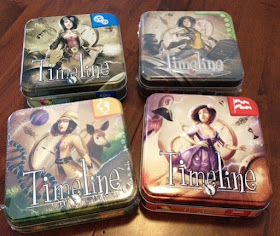A deceptively simple game that I've been playing recently is Timeline.
The premise of Timeline is very simple - you are supposed to place events (or inventions, discoveries, etc, based on which set you are using) in their correct order in the timeline. To start the game, each player is dealt a handful of cards, which they place in front of them on the table. One other card is dealt into the center of the table, date showing, to seed the timeline. (These cards each represent something that happened at a specific point in time. One side of the card depicts the event, and the other side depicts the event and also has a year on it.) Each turn, the active player attempts to play a card by placing it somewhere in the timeline and then flipping it over. If they have placed the event in the proper location, then their turn is over; otherwise, they must draw a new card. The first person to run out of cards is the winner.
 |
| The currently available versions of Timeline |
The next pro for Timeline is that there is, surprisingly, strategy about playing the game. With a normal hand, you will generally have some cards that you know pretty well, some that you have a decent idea about, and some that you have no clue about. But, with those, when should you play each card? Should you play the ones that you have no idea about first, and hope that you're able to successfully play them since your odds are better of guessing correctly when the timeline is small? If you do that, then the ones that you only have a vague idea about will become much harder to play later - after all, if you know that something happened in the 1800's, and there are several cards already played in the 1800's, then suddenly your card is much harder to play. What's more - you know what cards your opponents have. So, should you play some of your cards that happened around the same time as theirs in order to make their cards harder to play? Like I said, the game itself is very simple, but forming a strategy about the order of playing your cards adds some depth to the game.
 |
| Is this where the Can Opener goes?? |
The second con is that the enjoyment of the game is going to be highly dependent on the equality of the players. Since Timeline is a trivia game (and not a game of highly obscure trivia game like Wits and Wagers), some people will know more answers than others. And those people will win the most. So, the ideal group for Timeline will be a group of people that have an approximately equal knowledge of history.
The last con that I have for Timeline is that the cards drawn can sometimes highly favor one player. Why? Because there are some cards that are really obvious about where they go in the timeline. Cards like "The Earth is Formed." Well, I may not know an exact date for that, and regardless of what you believe about creation versus evolution, you still are going to know that this card goes earlier than anything else on the timeline. As long as a lot of these obvious cards aren't drawn, everything should be alright - but I had a game where I drew "The Earth is Formed," "Dinosaurs Appear," and "Dinosaurs Become Extinct" in my opening hand. These three cards were all especially easy to play, and, un-surprisingly, I won that game.
Overall, I give Timeline an 8.0/10. I'm glad to have it in my collection, and I intend to continue playing it for a long time, but the amount of time that I have to wait between plays keeps it from being one of my upper echelon games.
If Timeline sounds interesting, you might also check out Wits and Wagers, Biblios, and Code 777.

No comments:
Post a Comment